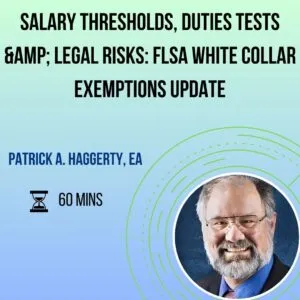Salary Thresholds, Duties Tests & Legal Risks: FLSA White Collar Exemptions Update

Salary Thresholds, Duties Tests & Legal Risks: FLSA White Collar Exemptions Update
$299.00

Webinar Information
Duration : 60 Mins
Date / Time(EST) : July 8, 2025 | 1:00 PM
Speaker Detail : Patrick A. Haggerty, EA
SalaryUpdate
Webinar Overview
In 2024, the U.S. Department of Labor (DOL) issued a Final Rule updating the salary threshold requirements for “white collar” exemptions under the Fair Labor Standards Act (FLSA). This rule aimed to raise the standard salary level for exempt employees and introduced an automatic updating mechanism. However, on November 15, 2024, the U.S. District Court for the Eastern District of Texas vacated the Final Rule, reverting the federal minimum salary threshold to $684 per week. Despite this reversal, employers are still obligated to ensure proper employee classification and compliance with both federal and state wage and hour laws.
What You’ll Learn:
This session provides a comprehensive look at the FLSA white collar exemptions, focusing on the executive, administrative, and professional exemptions. Attendees will gain clarity on the salary basis test, duties tests, and other requirements for exempt classification. We’ll explore the latest legal developments, common compliance challenges, and how employers can prepare for shifting regulatory landscapes.
Key Topics Include:
Current status of federal salary thresholds
The three-part exemption tests: salary basis, salary level, and duties
How to correctly classify employees and avoid misclassification pitfalls
How employer actions (e.g., salary deductions) can void exempt status
Recordkeeping requirements—even for exempt employees
Handling intermittent leave and partial-day absences correctly
Practical alternatives when employees don’t meet the threshold
Why Should Attend:
Misclassification is one of the most common (and costly) wage and hour violations. This webinar will arm HR professionals, payroll managers, and business owners with the knowledge and strategies needed to stay compliant and avoid back pay liability, penalties, and litigation.
Who Should Attend:
Payroll supervisors and professionals
HR managers and benefits administrators
Compliance and risk managers
Public accountants and payroll consultants
Internal auditors and public agency managers
Business owners and executives with payroll oversight
In 2024, the U.S. Department of Labor (DOL) issued a Final Rule updating the salary threshold requirements for “white collar” exemptions under the Fair Labor Standards Act (FLSA). This rule aimed to raise the standard salary level for exempt employees and introduced an automatic updating mechanism. However, on November 15, 2024, the U.S. District Court for the Eastern District of Texas vacated the Final Rule, reverting the federal minimum salary threshold to $684 per week. Despite this reversal, employers are still obligated to ensure proper employee classification and compliance with both federal and state wage and hour laws.
What You’ll Learn:
This session provides a comprehensive look at the FLSA white collar exemptions, focusing on the executive, administrative, and professional exemptions. Attendees will gain clarity on the salary basis test, duties tests, and other requirements for exempt classification. We’ll explore the latest legal developments, common compliance challenges, and how employers can prepare for shifting regulatory landscapes.
Key Topics Include:
Current status of federal salary thresholds
The three-part exemption tests: salary basis, salary level, and duties
How to correctly classify employees and avoid misclassification pitfalls
How employer actions (e.g., salary deductions) can void exempt status
Recordkeeping requirements—even for exempt employees
Handling intermittent leave and partial-day absences correctly
Practical alternatives when employees don’t meet the threshold
Why Should Attend:
Misclassification is one of the most common (and costly) wage and hour violations. This webinar will arm HR professionals, payroll managers, and business owners with the knowledge and strategies needed to stay compliant and avoid back pay liability, penalties, and litigation.
Who Should Attend:
Payroll supervisors and professionals
HR managers and benefits administrators
Compliance and risk managers
Public accountants and payroll consultants
Internal auditors and public agency managers
Business owners and executives with payroll oversight
Info
There are no reviews
Add your review





